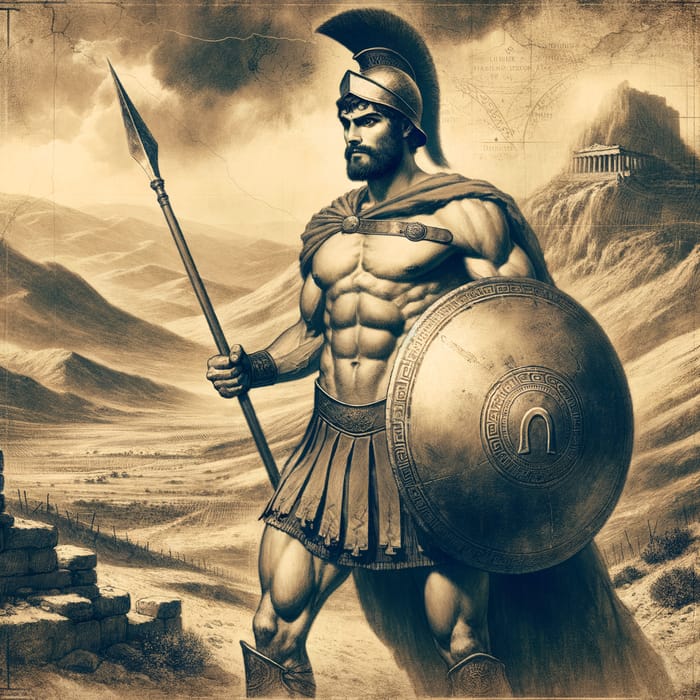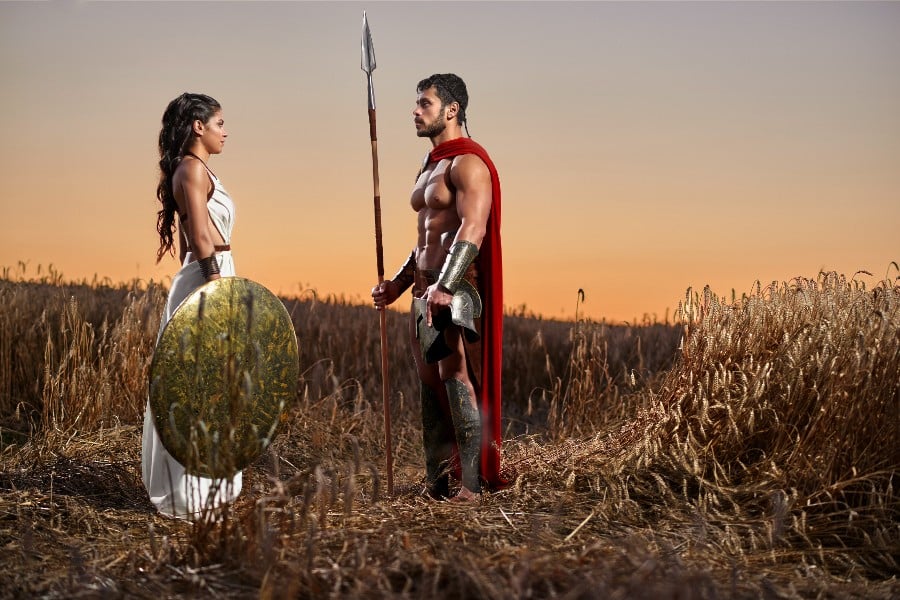The Life of an Ancient Spartan
 Spartan society, unlike its Athenian counterpart, wasn't known for flourishing arts or philosophical debates. Their focus was singular: creating the most formidable military force in all of Greece.
Spartan society, unlike its Athenian counterpart, wasn't known for flourishing arts or philosophical debates. Their focus was singular: creating the most formidable military force in all of Greece.
This obsession permeated every aspect of a Spartan's life, shaping them from birth into disciplined, fearless warriors.
At the tender age of seven, Spartan boys underwent a brutal and transformative training program called the Agoge. Separated from their families, they entered a communal barracks system where they lived under harsh conditions. Austere meals, minimal clothing, and harsh physical training became their reality. This wasn't just about building strength; it was about fostering resilience, resourcefulness, and the ability to endure pain and hardship.
The Agoge wasn't merely physical. Boys received basic literacy and music education, but the emphasis was on military strategy, obedience, and loyalty to Sparta. They were pitted against each other in grueling competitions, not just to test their skills but also to cultivate a ruthless fighting spirit. The Krypteia, a secret police force of adolescent Spartans, terrorized the Helot population, the conquered Messenians who served as Sparta's slave class. This brutality served a dual purpose: to instill fear in the Helots and to hone the boys' skills in warfare and survival.
As teenagers, the Agoge intensified. The boys, now called ephebes, faced even harsher training and public scrutiny. They were whipped during a religious festival, a test of their endurance and stoicism. Throughout their training, weak or sickly boys were ruthlessly exposed or abandoned, ensuring only the strongest and most hardened warriors remained. At the age of 20, the most capable ephebes became full Spartan citizens (Spartiates), entitled to participate in the Assembly and vote on matters of war and state. However, their military training continued well into their thirties.
This rigid system produced a unique warrior class. Spartan soldiers weren't just skilled fighters; they were a cohesive unit, drilled in phalanx formations where individual glory was sacrificed for the collective good. Their unwavering discipline and battlefield prowess were legendary, making them a force to be reckoned with throughout Greece.
Spartan Women: Strength Behind the Shield
 Spartan women, unlike their counterparts in other Greek city-states, enjoyed a surprising degree of freedom and social status. Unlike Athenian women, who were largely confined to the home, Spartan women underwent a rigorous physical training program similar to the boys, albeit less harsh. This emphasis on physical fitness wasn't just for aesthetics; it was to ensure they bore strong children who would become worthy Spartan warriors.
Spartan women, unlike their counterparts in other Greek city-states, enjoyed a surprising degree of freedom and social status. Unlike Athenian women, who were largely confined to the home, Spartan women underwent a rigorous physical training program similar to the boys, albeit less harsh. This emphasis on physical fitness wasn't just for aesthetics; it was to ensure they bore strong children who would become worthy Spartan warriors.
Spartan women also managed the household while their husbands were away serving in the military. They were expected to be strong, independent, and capable of running the estate in their husbands' absence. This autonomy and responsibility instilled a sense of pride and patriotism in Spartan women, who understood their role in perpetuating the warrior race.
However, this freedom came at a cost. Spartan women were primarily valued for their ability to produce strong offspring. Their lives were still circumscribed by societal expectations, and their primary role remained supporting the military state.
A Life Dedicated to Sparta
A Spartan's entire life revolved around the needs of the state. From the harsh realities of the Agoge to the regimented lives of adult Spartiates, individual desires were secondary to the collective good. Even marriage was regulated by the state, with the focus on producing strong children for Sparta, not personal happiness.Spartan men spent most of their lives in military barracks, returning home only briefly. They weren't farmers or artisans; those tasks were left to the Helots. Their sole purpose was to be professional soldiers, ever vigilant and ready to defend Sparta. This societal structure, while creating a formidable military force, came at a significant cost. Sparta lacked the cultural and intellectual vibrancy of other Greek city-states. Their obsession with war stifled artistic expression and philosophical inquiry.
Despite the harsh realities, being a Spartan warrior held a certain prestige. Their bravery and discipline were renowned throughout Greece. Spartan society may seem brutal and regimented by modern standards, but for them, it was a way of life that ensured their survival and dominance for centuries.
The Spartan society, with its unwavering dedication to military excellence, left a lasting mark on history. Their relentless pursuit of strength and discipline forged a formidable fighting force that dominated Greece for a significant period. However, this singular focus came at a cost. The stifling of artistic expression and intellectual pursuits limited Sparta's cultural impact.
The question remains: was the Spartan way a successful model for a society? While their military prowess is undeniable, one can argue that true success extends beyond the battlefield. A thriving society requires not just warriors, but also artists, philosophers, and inventors who contribute to a well-rounded civilization.
In conclusion, the life of an ancient Spartan was one of unwavering dedication to the state. Their rigid social structure and relentless training program produced legendary warriors, but ultimately limited their societal potential. The Spartan legacy serves as a reminder of the delicate balance between military strength and cultural development.






















































